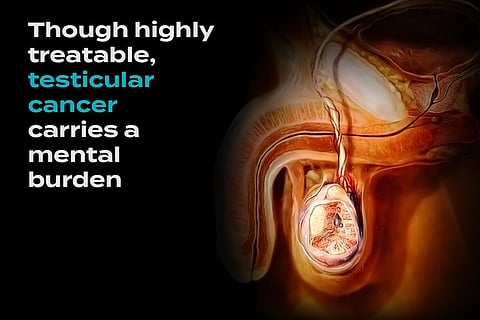Bridging the Gap - Health Equity for all
Managing Mental Health After Testicular Cancer
<p>From Movember to Lance Armstrong, there’s been a greater push in recent years to normalize the conversation around testicular cancer. Public awareness campaigns have helped to equip men with the signs and symptoms they need to stay vigilant, and an increasing number feel comfortable with sharing their story.</p>
<p>However, there’s one area in which the stigma stubbornly clings on: the emotional burden. Both during and after testicular cancer, men are vulnerable to issues that can take a serious toll on their mental health, and many suffer in silence out of fear of embarrassment.</p>
<p>Testicular cancer is mostly found in young men. The survival rate is exceptionally high, and treatments almost always involve the removal of the affected testicle. At first glance, the condition seems relatively straightforward compared to more lethal types like prostate cancer, but there is a hidden mental cost.</p>
<p>On top of the typical emotional challenges that cancer patients face — sadness, anxiety, anger, and difficulty expressing feelings to loved ones — testicular cancer presents its own set of challenges related to relationships, sexual functionality, self-esteem, and fertility, all of which can be life-changing.</p>
<p>The road to recovery is unique for each man, so being informed about the potential challenges is vital.</p>
<h2>Self-image and self-esteem</h2>
<p>For some men, the diagnosis or treatment can feel like a threat to their masculinity.</p>
<p>Losing a testicle can affect self-image in a way that’s often compared to that of breast cancer. The close relationship between self-image and self-esteem means that some survivors develop a fear of rejection or feel that their body is now inferior. With both cancer types, some survivors find that prosthetic substitutes can alleviate these feelings and help them to regain confidence.</p>
<p>Support groups with other survivors are another great option. Talking openly with others going through the same hardships can be a powerful coping mechanism.</p>
<h2>Sexual functionality</h2>
<p>Things might look different down there after surgery, but for some survivors, it’s not a big deal so long as everything works the same as before.</p>
<p>Not everyone is lucky, however. Complications related to sexual functionality are common, and this can have numerous knock-on effects.</p>
<p>Erectile dysfunction is a frequent issue, and it’s usually linked to chemotherapy medication lowering testosterone levels. This can have a devastating effect on the patient’s quality of life as it may lead to feelings of sexual inadequacy, which hurt relationships and compound emerging self-esteem issues.</p>
<figure><img alt="3D medical animation still showing comparison between Erection and Erectile dysfunction or Impotence | Source: Scientific Animations, Inc." class="img-responsive" src="https://cdn.storymd.com/optimized/2dZ87nUjAG/thumbnail.jpg" />
<figcaption>Comparison between erection and erectile dysfunction. <em>Source: Scientific Animations, Inc.</em></figcaption>
</figure>
<h2>Infertility</h2>
<p>Testicular cancer’s main demographic is young men, so some would-be fathers end up being stripped of the opportunity to conceive a child with their partner. Infertility means that the testicles are not producing enough sperm or that the sperm may be damaged, and numerous factors including the treatment type and age of the patient determine the likelihood. The condition can be temporary or permanent, and some men may regain their fertility over time following treatment while others do not.</p>
<p>Permanent cases are usually when both testicles had to be removed, leaving the patient with no means to produce sperm. A less clear-cut example is a retroperitoneal lymph node dissection (RPLND), a procedure that may cause nerve damage resulting in retrograde ejaculation. In this scenario, the semen can no longer be propelled forward during ejaculation, and so the man is effectively left infertile.</p>
<p>Elsewhere, chemo and radiation therapy may lower the sperm count, although this is usually only temporary. Things generally return to normal after treatment is finished, but it can take upwards of two years.</p>
<p>Whether or not these treatments will cause infertility is somewhat of a gamble, and for this reason your doctor may recommend using a sperm bank beforehand as “insurance”.</p>
<h2>More on Testicular Cancer</h2><ul><li><a href="https://soulivity.storymd.com/journal/6j49924cnm-testicular-cancer" target="_blank">Testicular Cancer: Risk Factors, Treatment, Prognosis</a></li><li><a href="https://soulivity.storymd.com/journal/qjor8dx0nj-testicular-cancer-screening" target="_blank">Testicular Cancer Screening</a></li><li><a href="https://soulivity.storymd.com/journal/vm9nn7augw-male-infertility" target="_blank">Male Infertility: Causes, Diagnosis, Treatment</a></li></ul>


